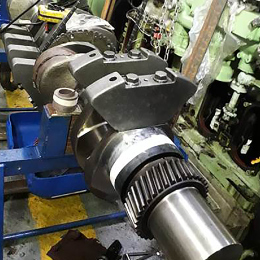
Metalock Brasil was appointed to polish the main journals and crankpins of the Yanmar auxiliary engine (Model 6N21ALUV) crankshaft, on board the vessel.
To do this it was necessary to remove the underslung crankshaft from the block and lay it on trestles, whilst the engine was being overhauled by the crew.
The service started at the port of Rio de Janeiro, with the inspection and design of structural reinforcement of the ceiling and support beams, for simultaneous hoisting of the crankshaft and engine block.
Metalock Brasil, Rio de Janeiro branch workshop, then fabricated the necessary pad-eyes, angle pieces and fixing jigs for lifting of the engine block.
The team then returned on board for the installation and welding of the reinforcements, pad-eyes and jigs according to the project design. The structure was then satisfactorily tested with a load of 4 tons, complemented with NDT Dye Penetrant tests on the welds.
With the vessel still at the same terminal in Rio de Janeiro, the engine block and crankshaft were then removed and the crankshaft placed and secured on trestles, to carry out the polishing of the journals and crankpins.
Metalock Brasil’s specialist technicians then fitted and aligned the in-situ machining equipment, Metalock Brasil’s own design and manufacture, and proceeded to sail with the vessel to Imbituba and Salvador to execute the work.
The devices to adapt the machine to the diameter of the pins had been prepared previously, since one device is specific for the main journals and the other for the crankpins.
To continue the service it was necessary that the ship remain stationary at anchor or moored. This phase of the repair could be completed while the vessel was berthed at Salvador. The polishing was performed in two stages, the first on the journals and pins that were free of the trestles and accessible, then the remainder after adjusting the position of the crankshaft on the trestles. After conclusion of the polishing our team left the vessel at Salvador and travelled to Rio.
When the vessel next called at Rio de Janeiro Metalock Brasil attended to reassemble the engine block and crankshaft (simultaneously). The crankshaft was then adjusted to its correct timing position, the bearing shells fitted and adjusted and the crankshaft coupled to the alternator flywheel.
After the repair was completed, the demobilization and transportation of tools, equipment and devices returned to Metalock Brasil’s Rio de Janeiro work-shop.
Voltar